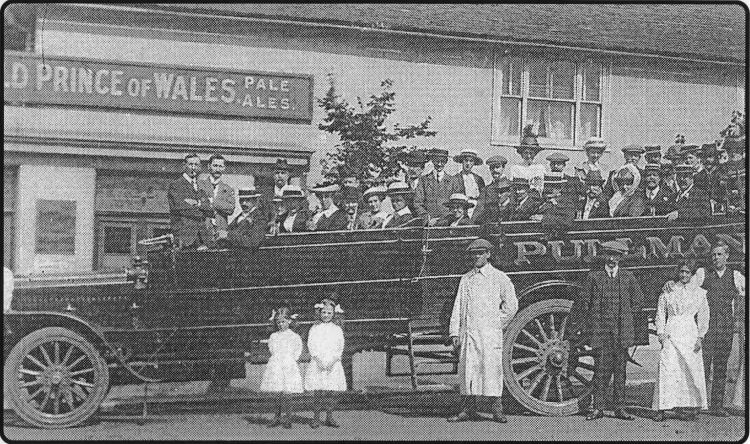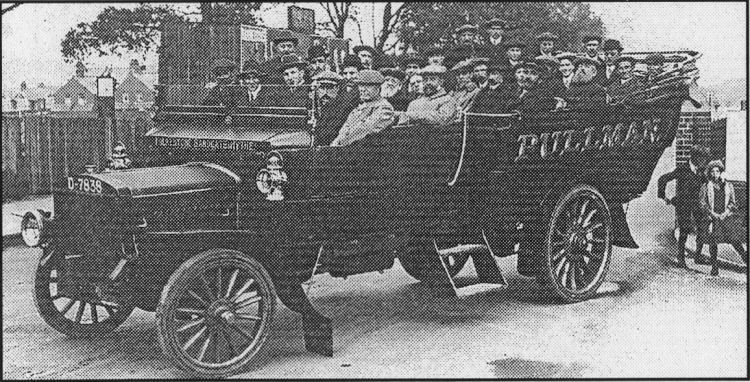
Published 24 May 2001


Riddle no more
REMEMBER the picture below of an old Folkestone charabanc, which featured in
Memories a few weeks ago? I asked if any reader could identify where it was
taken and received an e-mail message from Peter Bamford, of Shorncliffe
Crescent, Folkestone, to tell me it was taken in Cheriton.
I was shown a copy of the picture by author Roy Humphreys, of Hawkinge, who
was lent some interesting old postcards of Wills "Pullman" cars, as they
were known, by Peter Wills. He is a descendant of the once well known
Cheriton charabanc proprietor, 'Father' Ernest Wills.
The charabanc was built at the Maltby Motors' workshops in Sandgate and
first registered in 1912.
Peter Bamford, who is secretary of Folkestone & District Local History
Society, writes: "The photograph of the charabanc outing was taken on the
main road outside Cheriton Baptist Church.
"I have the same photo in my collection and I would say it was a Men's Bible
Class outing.
"The houses that can be seen in the background of the picture are those in
Surrenden Road and the fenced area is now made up of shops but, in those
days, was known as the Ashley Grange sports ground.
"To the right can be seen the original wall of the church grounds. It was
given up later to allow a pavement to be laid."
Peter goes on to say that the Church itself was opened in July 1908 by Mrs
Lloyd George. Earlier a corrugated building had been used for worship, from
1901 and was later used as a church hall, before being demolished sometime
in the 1950s.
Among his other pictures Peter says he has a similar postcard dated 1912, of
another Wills charabanc, with the registration number FN 517.
And Peter is still hoping to find out more about the occasion when a big
lineup of about a dozen
Cheriton Baptist Church, around the 1910-20 period, for what was obviously a
major church event.
Peter's postcard picture of the busy scene was featured in Memories back in
December. To remember the event, of course, you would have to be getting on
for around 100 years old but perhaps there is a picture of the event in
someone's family album somewhere, with some kind of caption. You never know!
Incidentally the reference to charabancs being built in Sandgate reminds me
that I
1882 to change the name of the main street, which was extremely narrow in
one spot, back from "Broadway" to High Street.
It had been given the name Broadway back in 1871 and, in some of the old
photographs of Sandgate, one certainly gets the impression of a broad sweep
of road in the centre.
But the High Street certainly narrowed considerably at either end of the
town.
Anyway, back in 1882 the town council was unanimous in voting to revert back
to "High Street."
DAVE Brycason, of Tontine Street, Folkestone, who is keenly interested in
any memorabilia concerning the Titanic disaster, has been researching the
subject for a long time and is hoping I will come across something to help
him while combing the 1901 Herald file for items for the "From Our Files"
feature.
Dave is trying to find out more about the early life of Elizabeth Nye (nee
Ramell), born in 1882, who was a survivor of the sinking of the Titanic. The
Herald, in May 1912 referred to the drowning of Elizabeth's sweetheart off a
Folkestone pier, butjjias been unable to find any
THIS former Cheriton based charabanc in the fleet of the late Ernest
Valentine Wills, who lived in Cheriton, featured among a collection of
photographs shown to me by Roy Humphreys, of Hawkinge. Some of them have
already been featured in Memories, and like those, this postcard picture is
owned by Peter Wills, of Cheriton, a descendant of the popular coach
proprietor. The charabanc group is pictured outside the Prince of Wales
public house in Guildhall Street, Folkestone, of the old coaches assembled
outside the was reading recently of proposals back in
 |
"White elephant at Hythe gets new management
*1 QH1 WILLIAM R Cobay, credited with hav-ing brought the Metropole to
the Leas, took over the lease of Hythe's “white elephant" — the Seabrook
Hotel (later called Imperial} built by the South Eastern Railway
Company. The hotel had proved ahead of its time. It didn't attract quite
the numbers of visitors by rail as expected^ development and attractions
of Hythe being slower to materialise than Hythe MP Sir Edward Watkin and
his fellow directors had anticipated. It had been hoped that the Gordon
Hotels group would take over the property, but negotiations fell
through. Alterations planned by the new bosses were to include numerous
passenger lifts and other improvements and close links were to be
maintained with the Hythe Golf Club. Earl Radnor was adding another
attraction at Folkestone, laying out a drive from the Upper Sandgate
Road along the base of the Plain and under the old Sandgate Lift bridge
into the lower road which, said Felix would prove a boon to invalids and
the elderly because it was so sheltered from the keen north and easterly
winds.
|
Death railway survivor in Leas stage manager role
*1 QC1 CYRIL Ernest Dixon, who was a PoW X90X in Japanese camps and
slaved and sweated with thousands of others on the notorious Railway of
Death, was the subject of a feature in the Herald about his work as
Stage Manager at the once highly popular town landmark, the Pleasure
Gardens Theatre. The town bade farewell to Alfred John English, for over
30 years MD of the town's Folkestone Express newspaper^ who died aged
84. The paper folded after its works and offices were destroyed in 1940
when a long-range shell crashed into the World’s Stores, in High Street
and fire gutted adjoining buildings. The paper was founded by his father
John English. Alfred, a mason and golf enthusiast, became the MD In 1906
in succession to his elder brother Tom English. One of the “Glorious
Glosters" Pte Reg Knowles, 29, was reported missing In Korea. Two new
Folkestone Rowing Club boats ^Freddie Reich,” named after a local man
who was a great club supporter over many years, and “Bob Baker” named
after the club secretary of 21 years, Mr R.J. Baker, were christened at
the club headquarters at Sandgate where members were celebrating a first
class season in their 99th year.
|
Soldiers help firemen fight fire, saving horses in stable
1QOA HYTHE firemen manning their steam fire engine fought a blaze which
destroyed a car, a taxi and a motorcycle combination in an outbuilding
at the Dukes Head Inn on the Dymchurch Road on a Sunday morning. Water
had to be pumped from Hythe Canal. King's Own Royal Regt soldiers
camping on the Green freed seven horses in adjoining stables as a
violent gale fanned flames. The outbuilding belonging to Mackesons, the
brewers, was completely gutted. Mr H Spencer Apps, MD of Martin Walter
Ltd garages, was made Transport Officer for the district during the
General Strike of 1926 and afterwards told how his organisation had, in
a typical day, loaded up 30 lorries with pork, vegetables and other
foods, the consignments being escorted by police to their various
destinations. He went on to talk of “The spirit of patriotism displayed
by many people ... evidenced by the splendid fleet of motor cars which
the owners place at my disposal for dispatch of mails to Dover,
Canterbury, New Romney and district day after day - and theyfind their
own petrol into the bargains Young men too, willingly lent their
motorcycles, free of charge, for carrying dispatches and other work, he
said.
|
Give pets identity discs - or risk losing them - warning
4 Q7C^ theatre and capacity audience came JLtJ IO back to the Leas
Pavilion after an interval 25 years ago in what promised to be a
successful season of drama. Howard Theatre Productions presented the
comedy “The Grass is Greener” to launch the 1976 season, the first of
programme of 20 productions. Local pet owners received a shock warning
that stray animals caught in the port area could be put down because of
the threat of rabies. One dog, which had no identity disc, was found
straying in the harbour and might have been killed, had the owner not
come forward, just in time. A Folkestone man and a woman visitor were
praised by Police after they saved a woman from drowning. The 50 year
old woman from London had been staying in Sandgate. There was a feather
in the cap for local craftsman Tony Lambert, a french polisher, when
striking replicas of the Crown jewels he made were sent to America for
its Bicentenary celebrations. They went on show at Dunhill's offices in
New York, a director of which was Michael Walter, son of Max Walter and
Mrs Walter, of Cheriton Road. The most expensive school never to be
built In the town was causing red faces among KCC officials. The
abortive project for a new school at Enbrook Road on the Golden Valley
estate was thought to have cost £100,000. Work started despite warnings
the land was unstable, but was soon abandoned. |
|



